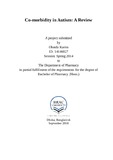Co-morbidity in autism: a review
Abstract
Autism spectrum disorder (ASD) is the most prevalent form of neurodevelopmental
disorder that interferes with social communication and behavioral development. Most of
the toddlers with ASD also show other psychiatric and/ or medical issues. This disorder
is known as ‘comorbidity’, and the conditions associated with comorbidity are defined as
‘comorbid’ conditions. The most common comorbid conditions seen in autism are
tourette syndrome, tuberous sclerosis, ADHD, sleep problem, epilepsy and seizure,
gastrointestinal dysfunction, fragile X syndrome etc. Other conditions, such as, obesity,
intellectual disability, OCD, fragile X syndrome, depression, bipolar disorder, motor
difficulties, down syndrome may also involve. This poses some serious challenges. For
instance, as several conditions are associated, differentiating among the symptoms
becomes a serious issue. It also interferes in selecting medication and treatment in
according to their root cause so that the choice of treatment does not deteriorate other
conditions. Therefore, the aim of this study is to highlight the co-morbid conditions
associated with ASD, their symptoms, probable causes, present treatment/ management
available by reviewing different reputed articles.

